Jamie Marchant's Blog, page 26
December 23, 2016
The Forsaken Crown Book Tour
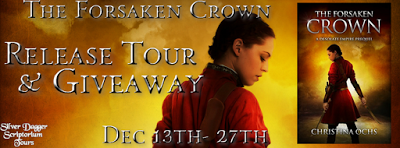
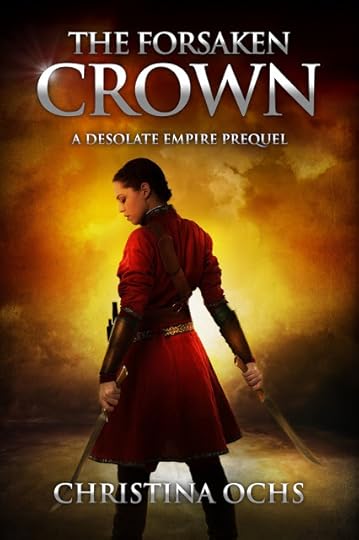 The Forsaken Crown:A Desolate Empire Prequelby Christina OchsGenre: Epic Fantasy
The Forsaken Crown:A Desolate Empire Prequelby Christina OchsGenre: Epic Fantasy Sonya is a disgraced mercenary with shattered ambitions. Kendryk is a young ruler in danger of being overthrown. An unlikely pair, they must learn to trust each other to survive the turmoil ahead. But with a corrupt regent, a disloyal aristocracy, and an army in their way, the future looks grim.The Forsaken Crown, a prequel to The Desolate Empire Series, delivers thrilling battles, devious political intrigue and compelling characters. The Forsaken Crown combines the action and excitement of the Three Musketeers with the sweeping imagery of fantasy. Readers are calling this powerful series "an all-ages Game of Thrones."Check inside to find out how to get a free copy of Rise of the Storm, Book One in the Desolate Empire Series.
Sonya is a disgraced mercenary with shattered ambitions. Kendryk is a young ruler in danger of being overthrown. An unlikely pair, they must learn to trust each other to survive the turmoil ahead. But with a corrupt regent, a disloyal aristocracy, and an army in their way, the future looks grim.The Forsaken Crown, a prequel to The Desolate Empire Series, delivers thrilling battles, devious political intrigue and compelling characters. The Forsaken Crown combines the action and excitement of the Three Musketeers with the sweeping imagery of fantasy. Readers are calling this powerful series "an all-ages Game of Thrones."Check inside to find out how to get a free copy of Rise of the Storm, Book One in the Desolate Empire Series.Goodreads * Buy Link * Amazon

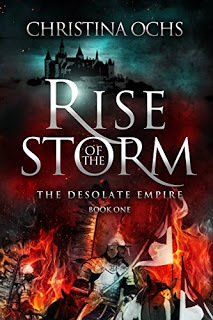 Rise of the Storm (Book 1)Amazon * Goodreads
Rise of the Storm (Book 1)Amazon * Goodreads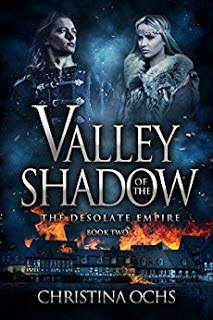 Valley of the Shadow (Book 2)Amazon * Goodreads
Valley of the Shadow (Book 2)Amazon * Goodreads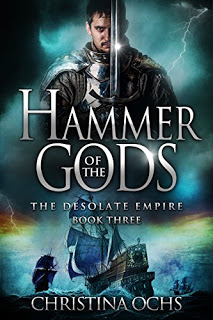 Hammer of the Gods (Book 3)Amazon * Goodreads
Hammer of the Gods (Book 3)Amazon * Goodreads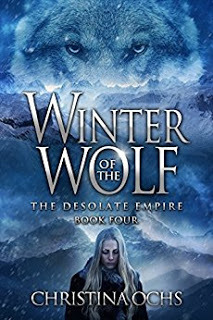 Winter of the Wolf (Book 4)Amazon * Goodreads
Winter of the Wolf (Book 4)Amazon * Goodreads
Sonya crept to the edge of the clearing until she had a clear view of the nearest fire. Only two men sat there.“Go to bed,” she muttered under her breath, not wishing to kill them if she didn’t have to. According to her information, they belonged to Kolnikov’s unit, and he was the one she wanted. The men didn’t move, their voices a low rumble, interspersed by the occasional laugh. The rest of the camp grew quiet and one after another, the fires died down. Only this one didn’t, and she needed to get past it. The longer she waited, the more could go wrong.“Kill one, grab the other,” she whispered to her troopers. “The live one will lead us to Kolnikov.”Faber, her sergeant, raised his eyebrows then nodded in agreement.Sonya dashed forward, her already bloody dagger at the ready. The men at the fire weren’t looking, had been staring into the flames too long to see well in the dark.One man grunted as Faber ran him through. Sonya grabbed the other around the neck, spinning him to face away from her, her hand over his mouth, her dagger at his throat. “Not a sound,” she whispered in Brianski. “Take us to Kolnikov, and I’ll let you live.”The man nodded, even as he sagged against her. He was only a little bigger than she was, and didn’t struggle. Her troopers fanned out, making sure no one else was nearby. “Let’s go,” she whispered to her captive, prodding him with her knee.He took a few hesitant steps, then moved faster. Sonya kept pace, making sure her blade stayed against his neck. The camp was quiet, though not completely asleep.“Anyone sees us, you die first,” Sonya murmured by way of encouraging him to take them along a quiet path. And he did, past the backs of tents, along the goat pens, right into the middle of the camp.Sonya found its size and order impressive, but then Briansk always had the best of everything. Finally, they reached a large tent near the center. “Kolnikov?” Sonya asked, and the man nodded. Faber slit the canvas with a long knife.Sonya pushed through, the prisoner in front of her. A lamp burned on a desk and behind it, a man had sprung to his feet.“Try anything and he dies,” she growled at him.“I’m unarmed,” the man said, his voice surprisingly soft.“What’s your name?” Sonya held her hostage even tighter.“Igor Kolnikov, Major in the imperial army of Pyotr, our immortal—”“Yes, yes,” Sonya snapped. “That’ll do. You must come with us,” she said in a rush, looking over her prize. Kolnikov had been writing a letter, but dropped the quill at the incursion. His face was broad and pale, framed with curly dark hair, black eyes slightly slanted. He wore a white shirt open at the neck.“Threatening that man is unnecessary.” Kolnikov sounded so calm Sonya wondered if he had some trick planned. “Please let him go.”“Once you’re in our custody, maybe,” Sonya said. “Faber, bind his hands.”“You’re making a big mistake,” Kolnikov said. “The war is over.”“Hah,” Sonya said, her tone mirthless. “It was still on an hour ago when one of your patrols ran into ours.”“All right then.” Kolnikov shrugged. “Take me back to your camp and I’ll prove it.”Brianskis were well-known liars, but just in case Kolnikov was right, Sonya didn’t kill her original hostage. Instead, she had him bound hand and foot, and left in the major’s tent. Even though Kolnikov’s bulk intimidated her, Sonya would never show it and grabbed him by the arm, just as she had the other man. But she was more cautious this time, sensing a barely restrained violence under Kolnikov’s genial tone. With his right arm wrenched behind his back, she laid her dagger flat against his collarbone, the tip touching his neck.“I won’t make any sudden movements then,” Kolnikov said, humor in his voice. Without turning his head, his eyes slid in Sonya’s direction. “Your Brianski is good. Where did you learn it?”“From years of fighting scum like you.” Sonya let the tip of the dagger poke into his skin. “Now shut up.” Not even over a friendly mug of ale would she tell him how she’d learned the language: she’d spent nearly two years in a Brianski prison, her superiors judging her too unimportant for a speedy exchange. That proof of her insignificance had rankled far more than the freezing conditions, insufficient food and brutish guards.Sonya grabbed Kolnikov even more roughly, then shoved him out of the tents and back the way they’d come. “Go ahead, Tchernak,” she whispered at one of her troopers. “Make sure the way is still clear and that there are no new sentries.”“There won’t be,” Kolnikov murmured, as Irena Tchernak disappeared into the darkness. “The guard won’t change for another hour.”“Good for us, better for you,” Sonya hissed through her teeth, her senses back on high alert. The camp was even quieter now as her party slipped between the tents. At the edge, she stepped around the body of the man they’d killed, the campfire nothing but coals now.“You shouldn’t have done that,” Kolnikov said, nodding at the body.“Shut up,” Sonya whispered again, shoving him toward the trees.Tchernak had rejoined them by now. “Coast is clear,” she murmured. “And no sign of that patrol either.” Sonya breathed a little easier now. Their horses shouldn’t be far away.

 Christina Ochs is the author of historical fantasy series, The Desolate Empire, which is based upon the events of the Protestant Reformation and the Thirty Years War (1618-48). Many of her characters are also based on historical figures.With degrees in history and business, Christina uses her writing to indulge her passion for reading and research. Publishing as an indie author provides an outlet for her entrepreneurial side and she is an avid supporter of fellow authors, both independent and traditionally published.Christina lives in a semi truck full time, traveling the United States with her truck driver husband and two cats, Phoenix and Nashville.
Christina Ochs is the author of historical fantasy series, The Desolate Empire, which is based upon the events of the Protestant Reformation and the Thirty Years War (1618-48). Many of her characters are also based on historical figures.With degrees in history and business, Christina uses her writing to indulge her passion for reading and research. Publishing as an indie author provides an outlet for her entrepreneurial side and she is an avid supporter of fellow authors, both independent and traditionally published.Christina lives in a semi truck full time, traveling the United States with her truck driver husband and two cats, Phoenix and Nashville.Facebook * Twitter * Website * Google + * Pinterest * Instagram Amazon * Goodreads
 a Rafflecopter giveaway
a Rafflecopter giveaway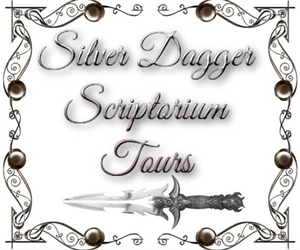
Published on December 23, 2016 03:00
December 21, 2016
Guest Author, Damon Norko
Meet my guest today, punk rocker turned novelist, Damon Norko.
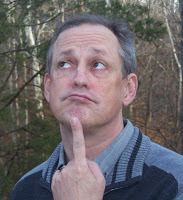
Many people remember Damon Norko from his stumping around the MD-DC area in the 1980s with a "Poems for Sale" sign on his back. He split his time between poetry and song-writing for his rock band, The Submensas (1983-1993). Songs from this era can be found at http://thesubmensas.bandcamp.com/ Life took hold of him for about a decade; he opened a chess store in downtown Baltimore and didn't write much until the early 2000s. His dystopian novel, The Delilah Factor (2010), which imagines a future world inhabited only by men, marked his return to the world of writing. Currently, he is an English teacher and theater director.
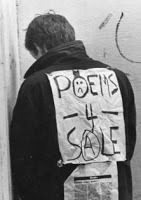
Interview1. What made you want to become a writer?
I began writing fiction after being a punk rocker in the early 1980s. Fiction seemed a natural extension of the lyrics of my songs. I self-published an early novel, Alias Art Mann (1985) which reflects my transition from bar chords and shouted lyrics (like “Fifty million Rambos/Are gnawing at the scene/Gulping Armageddon caviar/Having strange dreams”) to exploring more nuanced points, more in-depth characters, and a more elaborate world view. But I have always viewed artistic expression as the front line in the battle for human liberty.2. What are your biggest literary influences? Favorite authors and why?I believe that Kurt Vonnegut, Ray Bradbury, Robert Heinlein, Samuel Delaney, Issac Asimov and Ursula K. Leguin are perhaps my greatest early influences, all of whom are science fiction authors of some renown. Each of them has an insightful and far-reaching world view and I feel that there has long been a “conversation” about human interaction with technological development. But consistent in these writers is the sense of humanity, the feeling that “we’re all in this together.” I look for this connection in everything I read and have found it in other non-SF writers as well, such as Borges, O. Henry, and Poe. 3. If you could have written any other book by any other author, what would it be, and why?This is an interesting question, and oddly I am going to use someone else’s answer! One of my favorite stories is Jorge Luis Borges’s Pedro, Menard, Author of Don Quixote, which is written from the point of view of the executer of a man’s estate. The deceased man, Pedro Menard, had spent his life trying to write Cervantes’ Don Quixote — not copy it but REWRITE it exactly as it was. He had failed in this endeavor, of course, but the question that had always fascinated me was “Why?” And the meaning of the story wasn’t clear either. But it is interesting that we do indeed emulate the work of the greats, and indeed imitation is the greatest form of flattery. And you can’t help wondering after reading the story just how it would be to write such a work. And so, I would submit my answer to the question as “Don Quixote.”4. What are you reading at the moment? Would you recommend it to readers of this blog? Why?I recently completed reading every word of Ray Bradbury’s “100 Stories” compilation, which was absolutely fantastic. I highly recommend this book to anyone who is a student of the short story. So many plots and themes and ideas of Bradbury are left open-ended, allowing for rumination and expansion by those who have come afterward. Bradbury’s humanity shines through on every page and each image brings delight. A truly inspirational work!5. Do you think people have misconceptions about the speculative fiction? Why do you think it is a worthwhile genre?This question is spot-on, as you can see that I certainly think it’s a worthwhile genre. But what about others? In my humble opinion is that people do have misconceptions about the genre, mainly because of an association with conspiracy writings and the like which have cluttered up the marketplace. What I mean is, the synopses of many recent SF novels all read like Shonda Rhimes’ TV plots (which I actually like). But the average reader, wary of fringe material, is going to pass on some books that might have sound philosophy and a critical world view.6. Could you tell us a bit about your most recent book?The Ghost Cop is an inquiry into the world that might be if humanity ever managed to harness of the essence of the human soul. Would this result in yet another corporate product available only to the elites? What if a ghost rebelled? I tapped a character that made a walk-on in the previous ghost book, The Ghost Writer. I thought it’d be interesting to see how the ghost cop, who was supposed to be guarding against the unknown repercussions of the newly discovered ghost world, suddenly turned against it.7. Tell us a little about your plans for the future. Do you have any other books in the works?I am actively working on two plays, 1980 and 1990, and another YA-friendly novel that is almost done called The Levee (it is not part of my ‘ghost’ series’). The Levee foresees a future Earth in which the seas are dry. Water is the currency. Yet things seem very normal for Darren, a Food Mart worker, until he meets an old flame . . . I am also in the planning stage of another “ghost” book, as well as continuing my Reflections of the Future series of short stories, which now number 10. Some of these are published in various places across the web.Website: damonnorko.comFacebook: damon norkoTwitter: @damonnorkoAlso, don’t forget the Submensas on http://thesubmensas.bandcamp.com/Excerpt from The Ghost Cop (Black Rose Writing, 2016)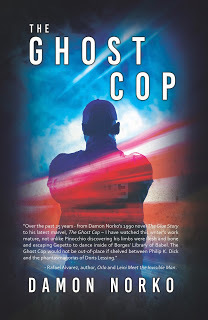
Like osmosis from yesterday’s rain, Thad rose up through the tree, past the peeling bark of the old limbs, and into the mesh of tightly wound younger branches, until he tickled the green twigs that were just unbending themselves to the world. Thad found a sunbeam that had penetrated the dawn mist, and rode the beam as it extended across the land, westward towards the rolling hills of I-70, to where the Orpheum Corporation’s flagship building lay, white and rectangular, surrounded by sidewalks and turf, its rooftop bristling with antennas. Instead of a fence, a grassy berm, sculpted with boulders that were hauled out of the developed farmland, had been constructed along the perimeter. Pennants billowed from electrical signature sensors that were staked along the top of the berm, a rim of nerve endings that spiraled data back to the great humming hive of technology, where large silver screens and field containment systems monitored the world of ghosts. Manning the screens were white-collared employees who were quite unconcerned about the corporation’s philosophy or its bottom line, but who were trying to afford their small apartments and to pay off their student loans while gaining invaluable on-the-job technology experience. (No one who put the name of Dr. Kelvin Herbert, the GCCE’s chief administrator, down as a reference, failed to get a job later on. It was a known fact.) The technicians were locked in fixed concentration upon the luminous screens, which displayed wavy lines of the ghosts who had to be surveilled at all times.To enter the GCCE, a ghost had to go through the east wall of the building, which was comprised of a long windowless rectangle of white cinderblock surmounted by an immense aluminum and glass skylight, arranged in layers, which bristled with four bulbous radar receptors and dozens of smaller antennas. The absence of windows was not an issue; the skylight did a magnificent job of capturing the rays from the morning sun. The rays were refracted throughout the cavernous reception area, to be absorbed into the potted plants, ferns and forsythias, which had aligned their stems to the skylight: waiting, thirsting, wilting.The wall was two hundred yards long and three stories high. Though it gleamed white, there ran a motley band of color along the bottom as if some monstrous, mischievous child had used up a giant box of crayons to cover the wall with graffiti. Here were scrawled, in ink or paint or nail polish or blood, or sometimes printed on paper and scotch-taped to the cinder blocks, messages from those whom the ghosts had left behind. On this wall there were notes, news, communiques, missives, Bible quotes, poems and pictures from mothers, fathers, sisters, brothers, friends, and fans who knew that their ghosts would have to come through this wall on their way to and from the Orpheum Corporation, and although the still-living humans could not see the ghosts, they still hoped that their messages would reach the intended target. The paper flyers flapped in the wind for a season, and then the remnants of the messages, plastic tape being resistant to the elements, pocked the paint.The loved ones merely sought closure, and so they were largely tolerated by the Orpheum Corporation as the price of doing business with immortality. But others who came to the wall were angry and sought revenge against real or perceived wrongs – victims, perhaps, of misbehaving ghosts. There were those who would show up in rags and in poor health, and who would blame their departed relatives for their lot in life, and seek compensation for their loss. These people would cause problems, forcing corporate security to step in. Some of the visitors never left the site. Because the corporate grounds were closed at night, they would camp in the woods and return in the morning to resume their vigil outside the wall, spreading blankets on the grass. Today, as usual, souls were stirring. A man and a woman had just arrived to claim their usual spot, he with a scraggly beard and long hair, she with a red bandana and a motorcycle jacket. Steaming cups of coffee were in their hands. Another man, further down, sat cross-legged, jabbering at the wall without waiting for the wall to respond. Still another man, near the end of the wall, had a magnifying glass in his hand and appeared to be scrutinizing the messages to see if they had been read. The jabbering man unbent his legs and leapt up. Shouting incoherently, he flung himself at the wall. It looked to Thad as though the fellow had fancied himself a ghost and had become convinced that he himself could go through the wall. Idiot! You have to die first!
If the book sounds as fascinating to you as it does to me, you can purchase it below:

Many people remember Damon Norko from his stumping around the MD-DC area in the 1980s with a "Poems for Sale" sign on his back. He split his time between poetry and song-writing for his rock band, The Submensas (1983-1993). Songs from this era can be found at http://thesubmensas.bandcamp.com/ Life took hold of him for about a decade; he opened a chess store in downtown Baltimore and didn't write much until the early 2000s. His dystopian novel, The Delilah Factor (2010), which imagines a future world inhabited only by men, marked his return to the world of writing. Currently, he is an English teacher and theater director.

Interview1. What made you want to become a writer?
I began writing fiction after being a punk rocker in the early 1980s. Fiction seemed a natural extension of the lyrics of my songs. I self-published an early novel, Alias Art Mann (1985) which reflects my transition from bar chords and shouted lyrics (like “Fifty million Rambos/Are gnawing at the scene/Gulping Armageddon caviar/Having strange dreams”) to exploring more nuanced points, more in-depth characters, and a more elaborate world view. But I have always viewed artistic expression as the front line in the battle for human liberty.2. What are your biggest literary influences? Favorite authors and why?I believe that Kurt Vonnegut, Ray Bradbury, Robert Heinlein, Samuel Delaney, Issac Asimov and Ursula K. Leguin are perhaps my greatest early influences, all of whom are science fiction authors of some renown. Each of them has an insightful and far-reaching world view and I feel that there has long been a “conversation” about human interaction with technological development. But consistent in these writers is the sense of humanity, the feeling that “we’re all in this together.” I look for this connection in everything I read and have found it in other non-SF writers as well, such as Borges, O. Henry, and Poe. 3. If you could have written any other book by any other author, what would it be, and why?This is an interesting question, and oddly I am going to use someone else’s answer! One of my favorite stories is Jorge Luis Borges’s Pedro, Menard, Author of Don Quixote, which is written from the point of view of the executer of a man’s estate. The deceased man, Pedro Menard, had spent his life trying to write Cervantes’ Don Quixote — not copy it but REWRITE it exactly as it was. He had failed in this endeavor, of course, but the question that had always fascinated me was “Why?” And the meaning of the story wasn’t clear either. But it is interesting that we do indeed emulate the work of the greats, and indeed imitation is the greatest form of flattery. And you can’t help wondering after reading the story just how it would be to write such a work. And so, I would submit my answer to the question as “Don Quixote.”4. What are you reading at the moment? Would you recommend it to readers of this blog? Why?I recently completed reading every word of Ray Bradbury’s “100 Stories” compilation, which was absolutely fantastic. I highly recommend this book to anyone who is a student of the short story. So many plots and themes and ideas of Bradbury are left open-ended, allowing for rumination and expansion by those who have come afterward. Bradbury’s humanity shines through on every page and each image brings delight. A truly inspirational work!5. Do you think people have misconceptions about the speculative fiction? Why do you think it is a worthwhile genre?This question is spot-on, as you can see that I certainly think it’s a worthwhile genre. But what about others? In my humble opinion is that people do have misconceptions about the genre, mainly because of an association with conspiracy writings and the like which have cluttered up the marketplace. What I mean is, the synopses of many recent SF novels all read like Shonda Rhimes’ TV plots (which I actually like). But the average reader, wary of fringe material, is going to pass on some books that might have sound philosophy and a critical world view.6. Could you tell us a bit about your most recent book?The Ghost Cop is an inquiry into the world that might be if humanity ever managed to harness of the essence of the human soul. Would this result in yet another corporate product available only to the elites? What if a ghost rebelled? I tapped a character that made a walk-on in the previous ghost book, The Ghost Writer. I thought it’d be interesting to see how the ghost cop, who was supposed to be guarding against the unknown repercussions of the newly discovered ghost world, suddenly turned against it.7. Tell us a little about your plans for the future. Do you have any other books in the works?I am actively working on two plays, 1980 and 1990, and another YA-friendly novel that is almost done called The Levee (it is not part of my ‘ghost’ series’). The Levee foresees a future Earth in which the seas are dry. Water is the currency. Yet things seem very normal for Darren, a Food Mart worker, until he meets an old flame . . . I am also in the planning stage of another “ghost” book, as well as continuing my Reflections of the Future series of short stories, which now number 10. Some of these are published in various places across the web.Website: damonnorko.comFacebook: damon norkoTwitter: @damonnorkoAlso, don’t forget the Submensas on http://thesubmensas.bandcamp.com/Excerpt from The Ghost Cop (Black Rose Writing, 2016)

Like osmosis from yesterday’s rain, Thad rose up through the tree, past the peeling bark of the old limbs, and into the mesh of tightly wound younger branches, until he tickled the green twigs that were just unbending themselves to the world. Thad found a sunbeam that had penetrated the dawn mist, and rode the beam as it extended across the land, westward towards the rolling hills of I-70, to where the Orpheum Corporation’s flagship building lay, white and rectangular, surrounded by sidewalks and turf, its rooftop bristling with antennas. Instead of a fence, a grassy berm, sculpted with boulders that were hauled out of the developed farmland, had been constructed along the perimeter. Pennants billowed from electrical signature sensors that were staked along the top of the berm, a rim of nerve endings that spiraled data back to the great humming hive of technology, where large silver screens and field containment systems monitored the world of ghosts. Manning the screens were white-collared employees who were quite unconcerned about the corporation’s philosophy or its bottom line, but who were trying to afford their small apartments and to pay off their student loans while gaining invaluable on-the-job technology experience. (No one who put the name of Dr. Kelvin Herbert, the GCCE’s chief administrator, down as a reference, failed to get a job later on. It was a known fact.) The technicians were locked in fixed concentration upon the luminous screens, which displayed wavy lines of the ghosts who had to be surveilled at all times.To enter the GCCE, a ghost had to go through the east wall of the building, which was comprised of a long windowless rectangle of white cinderblock surmounted by an immense aluminum and glass skylight, arranged in layers, which bristled with four bulbous radar receptors and dozens of smaller antennas. The absence of windows was not an issue; the skylight did a magnificent job of capturing the rays from the morning sun. The rays were refracted throughout the cavernous reception area, to be absorbed into the potted plants, ferns and forsythias, which had aligned their stems to the skylight: waiting, thirsting, wilting.The wall was two hundred yards long and three stories high. Though it gleamed white, there ran a motley band of color along the bottom as if some monstrous, mischievous child had used up a giant box of crayons to cover the wall with graffiti. Here were scrawled, in ink or paint or nail polish or blood, or sometimes printed on paper and scotch-taped to the cinder blocks, messages from those whom the ghosts had left behind. On this wall there were notes, news, communiques, missives, Bible quotes, poems and pictures from mothers, fathers, sisters, brothers, friends, and fans who knew that their ghosts would have to come through this wall on their way to and from the Orpheum Corporation, and although the still-living humans could not see the ghosts, they still hoped that their messages would reach the intended target. The paper flyers flapped in the wind for a season, and then the remnants of the messages, plastic tape being resistant to the elements, pocked the paint.The loved ones merely sought closure, and so they were largely tolerated by the Orpheum Corporation as the price of doing business with immortality. But others who came to the wall were angry and sought revenge against real or perceived wrongs – victims, perhaps, of misbehaving ghosts. There were those who would show up in rags and in poor health, and who would blame their departed relatives for their lot in life, and seek compensation for their loss. These people would cause problems, forcing corporate security to step in. Some of the visitors never left the site. Because the corporate grounds were closed at night, they would camp in the woods and return in the morning to resume their vigil outside the wall, spreading blankets on the grass. Today, as usual, souls were stirring. A man and a woman had just arrived to claim their usual spot, he with a scraggly beard and long hair, she with a red bandana and a motorcycle jacket. Steaming cups of coffee were in their hands. Another man, further down, sat cross-legged, jabbering at the wall without waiting for the wall to respond. Still another man, near the end of the wall, had a magnifying glass in his hand and appeared to be scrutinizing the messages to see if they had been read. The jabbering man unbent his legs and leapt up. Shouting incoherently, he flung himself at the wall. It looked to Thad as though the fellow had fancied himself a ghost and had become convinced that he himself could go through the wall. Idiot! You have to die first!
If the book sounds as fascinating to you as it does to me, you can purchase it below:
Published on December 21, 2016 03:00
December 20, 2016
Christmas in the Wilds of Pennsylvania
Tomorrow I am heading with my husband and son to visit my husband's parents in very rural Pennsylvania. I'll have limited access to the internet while I'm there, so you won't hear much from me directly over the next week. Several blog tour with excellent giveaways are scheduled during that time to keep you entertained.
To all Christians, Merry Christmas!

To non-religious people who still think Christmas is great fun, Merry Christmas!

To Jews, Happy Hanukkah!

To Pagans, Happy Solstice!
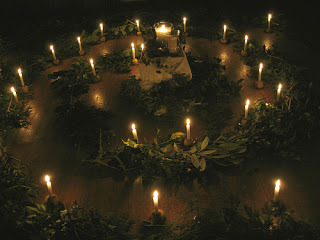
To Everyone Else, Happy Holidays!

To all Christians, Merry Christmas!

To non-religious people who still think Christmas is great fun, Merry Christmas!

To Jews, Happy Hanukkah!

To Pagans, Happy Solstice!

To Everyone Else, Happy Holidays!

Published on December 20, 2016 03:00
December 19, 2016
The Ho'koklonote'she
I wrote the following piece for Alabama: Views and Words, a book that is coming out edited by Frank Uhlig. The book combines photos of Alabama and the written word. The photos were all taken by Uhlig. The writings are from a variety of authors, including yours truly. The Ho'koklonote'sheThe Ho'koklonote'she chuckled as he flew over the deserted street: the empty store front and crumbling wood pillars. He had done this. He had caused the palefaces to flee from the land they’d stolen from his people. He swooped down from the sky and landed next to the wooden wall of the store patched with corrugated metal siding. As he landed, he transformed from owl to dog. Palefaces liked dogs, and it had usually been as a dog he’d tormented those who’d called this street home. The street still retained the heat of the day. The Ho'koklonote'she hated the asphalt that had replaced the forests that had dominated the land when his people dwelt here.Although why he called the Choctaw his people, Ho'koklonote'she was unsure. Before the coming of the palefaces, Ho'koklonote'she hadn’t considered the Choctaw his. He had nothing in common with any human. As a nature spirit tied to this place, this land belonged to him. While human could come and go, he always remained.He hadn’t been kind to the Choctaw. It was his nature to play tricks. His favorite trick had been to appear at a hunter’s fire and repeat the hunter’s thoughts. No human liked to hear their thoughts coming from a beast’s mouth, especially when those thoughts were dark. The hunters often went mad and ran from their fire. In the darkness, they would run off cliffs or trip and break their legs. It had been most amusing. He’d never thought he felt any attachment to them until they were forced off these lands.As the Choctaw left, the Ho'koklonote'she found himself fading. He never dreamed that human belief in him had fueled his power. The Choctaw’s belief had allowed him to torment them, but the palefaces who replaced them did not believe, and the Ho'koklonote'she soon found himself as no more than a shadow.Ho'koklonote'she snarled as he thought of his weakness during those dark years when he could barely transform from one form to another, and when his voice was so weak, the humans could no longer hear him. He’d nearly burst from rage before he’d discovered how to force them to believe. He’d never bothered a Choctaw child because it hadn’t seemed much of a challenge to scare a child. Unsporting even. But with the palefaces, he’d had to begin with the children because their minds were more open to belief than their elders. He crept into their dreams, and they woke screaming from nightmares. In time, enough children believed that they started to spread the legend of the Hoko dog. Children began to cower behind their parents whenever a dog walked by. He smiled, as he remembered family after family taking their pet to the pound because of the children’s terror. As more and more children believed, his power grew. It had been a glorious day when he could again tell adults their dark thoughts. It wasn’t long before they were shooting every dog on sight, so he switched to appearing as a cat or a sparrow. But he’d grown drunk with the power and did his job far too well. The palefaces had fled the land, and soon no more would take the dwellings they vacated.
The town became this empty relic. The rush of power thrilled him, but now, there was no one left to believe. He would fade and become as empty as the town itself.
The town became this empty relic. The rush of power thrilled him, but now, there was no one left to believe. He would fade and become as empty as the town itself.
Published on December 19, 2016 15:05
December 17, 2016
The Goddess's Choice audio, Chapter 11
Argblutal maneuvers to get near the princess in this week's installment. Will she fall for his manipulation?
If you can't wait for the next chapter, you can always buy it on Amazon.
If you can't wait for the next chapter, you can always buy it on Amazon.
Published on December 17, 2016 03:00
December 16, 2016
5 Ways of Presenting Character: Character as Thought
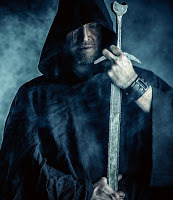 Another way to present your character to the reader is through his/her thoughts. Get inside your character's head and reveal what s/he hides from the world. A character's thoughts can reveal his/her desire. It is through The Ghost's thoughts that the reader learns of his new life plan in the beginning of The Ghost in Exile:
Another way to present your character to the reader is through his/her thoughts. Get inside your character's head and reveal what s/he hides from the world. A character's thoughts can reveal his/her desire. It is through The Ghost's thoughts that the reader learns of his new life plan in the beginning of The Ghost in Exile: The Ghost had long ago earned his place in the seven hells. Now, he must embrace the fact that he had one skill and one purpose—to kill those who needed to die. For a brief time he’d tried to forget that, and because he hesitated to kill a monster, the man had nearly destroyed his homeland and his daughter. Some people’s deaths were a thing to be celebrated rather than mourned, and because he was forever tainted, forever a killer, he should be the one to kill them.
Just as Samantha's thoughts tell the reader of her far less bloody desire when the reader is introduced to her in The Goddess's Choice:
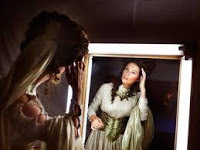 The Princess Samantha sat at her dressing table and glowered at her reflection as her maids dressed her hair. She detested balls and loathed the hundreds of suitors who flocked around her, spouting empty flattery: “I have never seen a lovelier flower, Your Highness!” or “Your eyes rival the brilliance of the stars, Your Highness!” If I hear that one again, I’ll vomit. It wouldn’t be quite so bad if even one of them meant it. Sometimes she wished . . . . She pushed the thought away. She was the heir to the throne. She couldn’t expect romance.
The Princess Samantha sat at her dressing table and glowered at her reflection as her maids dressed her hair. She detested balls and loathed the hundreds of suitors who flocked around her, spouting empty flattery: “I have never seen a lovelier flower, Your Highness!” or “Your eyes rival the brilliance of the stars, Your Highness!” If I hear that one again, I’ll vomit. It wouldn’t be quite so bad if even one of them meant it. Sometimes she wished . . . . She pushed the thought away. She was the heir to the throne. She couldn’t expect romance.People often do not tell anyone their deepest desires. Still, less do they reveal their strongest fears. When Samantha discovers that her ability to see auras means she is not the king’s true heir, she keeps those fears to herself:
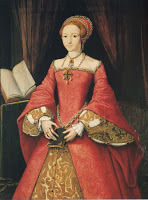 Hours later, Samantha put down the last volume. She had no doubts. Although the books disagreed on some minor aspects of an aurora’s power, it was “universally agreed upon” that she was a bastard. This was much, much worse than being mad. Her mother was little better than a whore, and she wasn’t the heir. She was a fraud, an imposter, some foundling foisted on the king without his knowledge. She wanted to scream, tear the books to pieces, and dissolve into a flood of tears, but she was too devastated even to move.
Hours later, Samantha put down the last volume. She had no doubts. Although the books disagreed on some minor aspects of an aurora’s power, it was “universally agreed upon” that she was a bastard. This was much, much worse than being mad. Her mother was little better than a whore, and she wasn’t the heir. She was a fraud, an imposter, some foundling foisted on the king without his knowledge. She wanted to scream, tear the books to pieces, and dissolve into a flood of tears, but she was too devastated even to move.My poor father! This will kill him! She didn’t know how many times Solar had told her of his long wait for an heir. He’d insisted if he had died without one, competing claimants would tear Korthlundia apart. My father worked his entire life to prevent this, and I have failed him. Who knows how many thousands will die because of me?
While thoughts give the reader a peek into the character’s mind, for those thoughts to become reveal, they must eventually be translated into action. After stewing about her bastardry for some time, Samantha takes action:
 She certainly needed men loyal to her. She picked up a quill and dipped it in ink. On a sheet of paper, she wrote the names of the four men whose auras she’d seen—Phelan, Brice, Bearach, and Conroy. She called Darhour and handed him the paper. “Add these to my guard.”
She certainly needed men loyal to her. She picked up a quill and dipped it in ink. On a sheet of paper, she wrote the names of the four men whose auras she’d seen—Phelan, Brice, Bearach, and Conroy. She called Darhour and handed him the paper. “Add these to my guard.” These men, like Kailen and Darhour, would loyally serve a bastard; she wished she knew if she were damning herself by allowing them to do so.
While thoughts can tell us much about a character, it is what they do that ultimately reveals who they are.
Published on December 16, 2016 03:00
December 14, 2016
Guest Author, Robert Ongley
Meet my fellow Black Rose Writing author, Robert Ongley, and delve into the spirit realm.
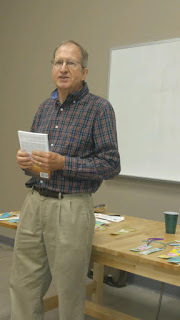 Robert Ongley was born in 1949 in Pennsylvania. The family lived in far upstate New York, followed by Niagara Falls, NY, then rural Pennsylvania again. As soon as he was able to write, he was writing fiction. In 1972, he took a job as a sportswriter for a weekly newspaper.
Robert Ongley was born in 1949 in Pennsylvania. The family lived in far upstate New York, followed by Niagara Falls, NY, then rural Pennsylvania again. As soon as he was able to write, he was writing fiction. In 1972, he took a job as a sportswriter for a weekly newspaper.
In 1973 and 1974, he traveled around the USA, working as needed to keep going. When his car gave out, he hitchhiked. Great people and great adventures enriched his life. The journey took him to Santa Barbara, where he lived for over 20 years. Writing was secondary to jobs, business, marriage, raising children and spiritual life. He did find time to write sports for another newspaper plus comedy screenplays, radio plays, a book of humor and some comic strips with a friend and collaborator.
He wrote many songs during those years as well as a few solo short stories, a self-published baseball slang dictionary, a novella and a novel. When he lost his job in 2012, the way was opened to write more and market some of his unsold material. His novel From The Beginning was self-published as an e-book in 2013 as he worked on a second novel that has since been published. Now living in Tucson, Robert Ongley is enjoying life more than ever.
Interview1. Tell us a little about yourself?
As with many writers, I have had to make my living working at something else. My primary career turned out to be as an insurance adjuster and investigator. This was not at all how I pictured it would be, but it helped my wife and I raise two children and have some of the material things in life we may not otherwise have been able to afford. From the writing perspective, however, it had an unexpected benefit. I was required to write thousands of reports on the cases I handled. My writing style had been perhaps too verbose and rhetorically ornate. I learned to be more clear and concise as a result of all those reports, so that career served to hone my skills.
2. What made you want to become a writer?
It just happened. As soon as I could write, I started writing stories, and I remember vividly having the thought, “I want to be an author.” It was my purpose.
3. What are your biggest literary influences? Favorite authors and why?
J.R.R Tolkien was a huge influence on my storytelling. Kurt Vonnegut made me want to convey humor in my work. More contemporary authors Raymond E. Feist and Ken Follett have had some influence on my approach to my craft, but my all-time favorite remains John Steinbeck. His gritty stories about real people and real life have touched me deeply.
4. What are you reading at the moment? Would you recommend it to readers of this blog? Why?
Among other things, I am currently reading The Neverending Story. I saw the film when it was released, but I recently found a copy of the book that belongs to my daughter, and I had to check it out. I would definitely recommend it to your readers. It has the charm of C.S. Lewis, the hero's journey of a Tolkien character and imagination as fresh as any tale.
5. Tell us something about how you write? i.e. are you a plotter or a pantser? Do you have any weird or necessary writing habits or rituals?
I'm a writer who needs structure. Writing on a schedule brings with it comfort and a sense of fulfillment. If I'm writing, all is right with the world. I like targeting, whether it's number of words per day or completion of a section. So, as you might guess, I'm a plotter. I make the outline and connect the dots, although I am always open to allowing spontaneous creativity to take over whenever a new idea presents itself. In From The Beginning, once the spiritual being found Planet Earth and decided to be born into a body, I knew I wanted to create its entire lifetime. Born the year after my birth, Joe was living the years I had lived and thus his life paralleled mine in many ways—until he reached the future. In any case, I had a clear map to follow...chronologically, at least.
6. Of all the characters you have created, which is your favorite and why?
I totally enjoy creating characters, the quirkier the better. My favorite to date has to be Owen Dooley. He appears in a first-person short story called Pleasantly Insane, part of a collection I'm calling Pleasantly Insane and Other Stories from a Deranged Mind. I have barely started shopping this book around to publishers. I enjoyed this character so much because he knows he has a mental illness, but it is one that makes him appear to fit in perfectly well with those around him.
7. What else would you like readers to know about you or your work?
As a youth, I struggled with being disciplined enough to write consistently and to finish what I started. After marrying and starting a family, I was too busy making a living to pursue a writing career. But I kept my hand in one way or another, involving myself in some kind of writing project, until I couldn't stand living without authoring a novel. I started From The Beginning by dictating it into a cassette recorder while driving on long work-related road trips. I wrote 150 pages that way. It took over 10 years to complete with all the lapses and gaps when I wasn't working on it. I finally reached a time in my life when I could write daily, on schedule. Since then, I self-published From The Beginning, followed by a short story and a book of humor. Then a publisher accepted my most recent novel, Boundless Trust, and it is in print. A real dream come true. The point is to never give up. Intention, persistence and perseverance will carry you to your goals.8. Where can we find you online? Blog:http://www.robertongley.com/sample-page/blog/Website: http://www.robertongley.com/Facebook: https://www.facebook.com/profile.php?id=100012446344517Amazon: https://www.amazon.com/gp/profile/A3KAN6NUSDR47V?ie=UTF8&ref_=sv_ys_4Linked In: https://www.linkedin.com/in/bo-ongley-7166a157?trk=nav_responsive_tab_profile
From the Beginning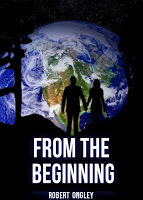 A spiritual being who has always existed outside the material universe makes a decision to experience this universe of matter and space from the inside. After touring around without physical form through the innumerable wondrous phenomena of this plane, the being happens upon Planet Earth. Observing the poor state of relations among those in the human race, the being makes it a quest to raise the level of understanding between people around the globe. This novel then follows the entire life of this being, born into a regular family in a small American town. Knowing where he came from and his complete purpose for being here, Joe faces the challenges of human life from a unique perspective. With the love of his life, his music and an adventurous spirit, he pursues his altruistic goals for the good of humanity. His remarkable journey from 1950 to present and into the future is nostalgic, provocative and perhaps foretelling.
A spiritual being who has always existed outside the material universe makes a decision to experience this universe of matter and space from the inside. After touring around without physical form through the innumerable wondrous phenomena of this plane, the being happens upon Planet Earth. Observing the poor state of relations among those in the human race, the being makes it a quest to raise the level of understanding between people around the globe. This novel then follows the entire life of this being, born into a regular family in a small American town. Knowing where he came from and his complete purpose for being here, Joe faces the challenges of human life from a unique perspective. With the love of his life, his music and an adventurous spirit, he pursues his altruistic goals for the good of humanity. His remarkable journey from 1950 to present and into the future is nostalgic, provocative and perhaps foretelling.
ExcerptLife unencumbered by body or form or any other physical limitation. This is spirit. This is being with serenity and nothing more until decision. In the void, there had been no problems, no goals. There were no objectives, no disappointments, no triumphs. There was no physical beauty, no ugliness. There was, however, a perfect peace and the simple joy of being. At the moment of decision, all of this was at risk, although the entity had no misgiving and certainly no fear of the future it had just created.The being knew of the physical universe, much as those in the physical universe know of the spiritual without any actual evidence of it. Finding the way in was no problem. That was simply the decision, more specifically the decision to locate oneself in space. And so it was that the being first assumed a viewpoint in space.Akin to a slow-burning candle, the spiritual being new to the physical universe was in no hurry to partake of the action as a player. It located itself in a region of deep space light years from the nearest star.Time passed, galaxies floated slowly through the vast expanse viewed by the being and the twinkling alone was all the action the being needed. To look, to simply perceive was plenty of action for a life unit whose serene existence was the usual and the everlasting.It is irrelevant to count the years that passed while the being simply viewed this sector of the universe without so much as one change in location. Life in the universe was good and the being was filled with rapture.Eventually, however, another decision followed. The being never ceased to be amazed by the movement of celestial bodies throughout its sector. This creation was a sheer masterstroke. Thus the being decided to take part in the wonder of change and motion. It willed itself to start in the direction of the brightest star in its 360-degree view. But nothing happened—no change, no motion. The being was patient. There was no hurry, but it simply could not understand this inability to do.It was after the array of stars in sight had completely rotated through its usual pattern several times that the being came to realize its mistake. Assumption of viewpoint was not what it appeared to be. It was an illusion of location. The being was not part of space. It simply viewed space and everything in it.With that realization, the being pushed the universe away from itself and suddenly realized it was viewing now from the very edge of the universe, the ever-expanding universe, and was looking at the nearest cluster of stars growing smaller and smaller as the outer wall of space moved further and further from the stars.It was then that the being felt its own view expanding with the growing universe in complete synchronization. The sound was all-pervasive, the sound of the creation of the universe. It was a multi-harmonic roar that never ceased. Then, with admiration of the splendor of it all, the being heard in it a chord of infinite depth. It was a celestial wonder, perhaps the voice of God.
If the above interests you, the book can be found on Amazon:
 Robert Ongley was born in 1949 in Pennsylvania. The family lived in far upstate New York, followed by Niagara Falls, NY, then rural Pennsylvania again. As soon as he was able to write, he was writing fiction. In 1972, he took a job as a sportswriter for a weekly newspaper.
Robert Ongley was born in 1949 in Pennsylvania. The family lived in far upstate New York, followed by Niagara Falls, NY, then rural Pennsylvania again. As soon as he was able to write, he was writing fiction. In 1972, he took a job as a sportswriter for a weekly newspaper. In 1973 and 1974, he traveled around the USA, working as needed to keep going. When his car gave out, he hitchhiked. Great people and great adventures enriched his life. The journey took him to Santa Barbara, where he lived for over 20 years. Writing was secondary to jobs, business, marriage, raising children and spiritual life. He did find time to write sports for another newspaper plus comedy screenplays, radio plays, a book of humor and some comic strips with a friend and collaborator.
He wrote many songs during those years as well as a few solo short stories, a self-published baseball slang dictionary, a novella and a novel. When he lost his job in 2012, the way was opened to write more and market some of his unsold material. His novel From The Beginning was self-published as an e-book in 2013 as he worked on a second novel that has since been published. Now living in Tucson, Robert Ongley is enjoying life more than ever.
Interview1. Tell us a little about yourself?
As with many writers, I have had to make my living working at something else. My primary career turned out to be as an insurance adjuster and investigator. This was not at all how I pictured it would be, but it helped my wife and I raise two children and have some of the material things in life we may not otherwise have been able to afford. From the writing perspective, however, it had an unexpected benefit. I was required to write thousands of reports on the cases I handled. My writing style had been perhaps too verbose and rhetorically ornate. I learned to be more clear and concise as a result of all those reports, so that career served to hone my skills.
2. What made you want to become a writer?
It just happened. As soon as I could write, I started writing stories, and I remember vividly having the thought, “I want to be an author.” It was my purpose.
3. What are your biggest literary influences? Favorite authors and why?
J.R.R Tolkien was a huge influence on my storytelling. Kurt Vonnegut made me want to convey humor in my work. More contemporary authors Raymond E. Feist and Ken Follett have had some influence on my approach to my craft, but my all-time favorite remains John Steinbeck. His gritty stories about real people and real life have touched me deeply.
4. What are you reading at the moment? Would you recommend it to readers of this blog? Why?
Among other things, I am currently reading The Neverending Story. I saw the film when it was released, but I recently found a copy of the book that belongs to my daughter, and I had to check it out. I would definitely recommend it to your readers. It has the charm of C.S. Lewis, the hero's journey of a Tolkien character and imagination as fresh as any tale.
5. Tell us something about how you write? i.e. are you a plotter or a pantser? Do you have any weird or necessary writing habits or rituals?
I'm a writer who needs structure. Writing on a schedule brings with it comfort and a sense of fulfillment. If I'm writing, all is right with the world. I like targeting, whether it's number of words per day or completion of a section. So, as you might guess, I'm a plotter. I make the outline and connect the dots, although I am always open to allowing spontaneous creativity to take over whenever a new idea presents itself. In From The Beginning, once the spiritual being found Planet Earth and decided to be born into a body, I knew I wanted to create its entire lifetime. Born the year after my birth, Joe was living the years I had lived and thus his life paralleled mine in many ways—until he reached the future. In any case, I had a clear map to follow...chronologically, at least.
6. Of all the characters you have created, which is your favorite and why?
I totally enjoy creating characters, the quirkier the better. My favorite to date has to be Owen Dooley. He appears in a first-person short story called Pleasantly Insane, part of a collection I'm calling Pleasantly Insane and Other Stories from a Deranged Mind. I have barely started shopping this book around to publishers. I enjoyed this character so much because he knows he has a mental illness, but it is one that makes him appear to fit in perfectly well with those around him.
7. What else would you like readers to know about you or your work?
As a youth, I struggled with being disciplined enough to write consistently and to finish what I started. After marrying and starting a family, I was too busy making a living to pursue a writing career. But I kept my hand in one way or another, involving myself in some kind of writing project, until I couldn't stand living without authoring a novel. I started From The Beginning by dictating it into a cassette recorder while driving on long work-related road trips. I wrote 150 pages that way. It took over 10 years to complete with all the lapses and gaps when I wasn't working on it. I finally reached a time in my life when I could write daily, on schedule. Since then, I self-published From The Beginning, followed by a short story and a book of humor. Then a publisher accepted my most recent novel, Boundless Trust, and it is in print. A real dream come true. The point is to never give up. Intention, persistence and perseverance will carry you to your goals.8. Where can we find you online? Blog:http://www.robertongley.com/sample-page/blog/Website: http://www.robertongley.com/Facebook: https://www.facebook.com/profile.php?id=100012446344517Amazon: https://www.amazon.com/gp/profile/A3KAN6NUSDR47V?ie=UTF8&ref_=sv_ys_4Linked In: https://www.linkedin.com/in/bo-ongley-7166a157?trk=nav_responsive_tab_profile
From the Beginning
 A spiritual being who has always existed outside the material universe makes a decision to experience this universe of matter and space from the inside. After touring around without physical form through the innumerable wondrous phenomena of this plane, the being happens upon Planet Earth. Observing the poor state of relations among those in the human race, the being makes it a quest to raise the level of understanding between people around the globe. This novel then follows the entire life of this being, born into a regular family in a small American town. Knowing where he came from and his complete purpose for being here, Joe faces the challenges of human life from a unique perspective. With the love of his life, his music and an adventurous spirit, he pursues his altruistic goals for the good of humanity. His remarkable journey from 1950 to present and into the future is nostalgic, provocative and perhaps foretelling.
A spiritual being who has always existed outside the material universe makes a decision to experience this universe of matter and space from the inside. After touring around without physical form through the innumerable wondrous phenomena of this plane, the being happens upon Planet Earth. Observing the poor state of relations among those in the human race, the being makes it a quest to raise the level of understanding between people around the globe. This novel then follows the entire life of this being, born into a regular family in a small American town. Knowing where he came from and his complete purpose for being here, Joe faces the challenges of human life from a unique perspective. With the love of his life, his music and an adventurous spirit, he pursues his altruistic goals for the good of humanity. His remarkable journey from 1950 to present and into the future is nostalgic, provocative and perhaps foretelling.ExcerptLife unencumbered by body or form or any other physical limitation. This is spirit. This is being with serenity and nothing more until decision. In the void, there had been no problems, no goals. There were no objectives, no disappointments, no triumphs. There was no physical beauty, no ugliness. There was, however, a perfect peace and the simple joy of being. At the moment of decision, all of this was at risk, although the entity had no misgiving and certainly no fear of the future it had just created.The being knew of the physical universe, much as those in the physical universe know of the spiritual without any actual evidence of it. Finding the way in was no problem. That was simply the decision, more specifically the decision to locate oneself in space. And so it was that the being first assumed a viewpoint in space.Akin to a slow-burning candle, the spiritual being new to the physical universe was in no hurry to partake of the action as a player. It located itself in a region of deep space light years from the nearest star.Time passed, galaxies floated slowly through the vast expanse viewed by the being and the twinkling alone was all the action the being needed. To look, to simply perceive was plenty of action for a life unit whose serene existence was the usual and the everlasting.It is irrelevant to count the years that passed while the being simply viewed this sector of the universe without so much as one change in location. Life in the universe was good and the being was filled with rapture.Eventually, however, another decision followed. The being never ceased to be amazed by the movement of celestial bodies throughout its sector. This creation was a sheer masterstroke. Thus the being decided to take part in the wonder of change and motion. It willed itself to start in the direction of the brightest star in its 360-degree view. But nothing happened—no change, no motion. The being was patient. There was no hurry, but it simply could not understand this inability to do.It was after the array of stars in sight had completely rotated through its usual pattern several times that the being came to realize its mistake. Assumption of viewpoint was not what it appeared to be. It was an illusion of location. The being was not part of space. It simply viewed space and everything in it.With that realization, the being pushed the universe away from itself and suddenly realized it was viewing now from the very edge of the universe, the ever-expanding universe, and was looking at the nearest cluster of stars growing smaller and smaller as the outer wall of space moved further and further from the stars.It was then that the being felt its own view expanding with the growing universe in complete synchronization. The sound was all-pervasive, the sound of the creation of the universe. It was a multi-harmonic roar that never ceased. Then, with admiration of the splendor of it all, the being heard in it a chord of infinite depth. It was a celestial wonder, perhaps the voice of God.
If the above interests you, the book can be found on Amazon:
Published on December 14, 2016 14:19
Last Day of the 14 Days of Reader Christmas Giveaway!

Can I have your attention please! This GIVEAWAY deserves a Drum Roll and a Standing Ovation! Take your Christmas Holiday and read one of these beauties! Every author who participated in this event has donated a SIGNED BOOK!! Yes, a SIGNED BOOK!! I have been so honored to have these gorgeous things in my home, even for a limited time!Click the link below to register! www.rafflecopter.com/rafl/display/5662c78f9
Published on December 14, 2016 14:18
December 13, 2016
Day 13 of The Reader Christmas Giveaway
 Ho Ho Ho Merry Christmas! Make sure to load this adorable plate up with sugary sweetness on Christmas Eve night for Santa!
Ho Ho Ho Merry Christmas! Make sure to load this adorable plate up with sugary sweetness on Christmas Eve night for Santa!Click the link below for a chance to win!
www.rafflecopter.com/rafl/display/5662c78f0
Published on December 13, 2016 08:05
Sookie Stackhouse, Charlaine Harris's mind reader
 I'm back to my favorite character series this week with Charlaine Harris's Sookie Stackhouse. Harris introduces Sookie in Dead After Dark and does a marvelous job developing her after the 13 book series. True to my affinity for the tortured soul, Sookie has her fair share of trouble, chief among them is her ability to read minds. She refers to it as a disability because she can't turn in off but has the
I'm back to my favorite character series this week with Charlaine Harris's Sookie Stackhouse. Harris introduces Sookie in Dead After Dark and does a marvelous job developing her after the 13 book series. True to my affinity for the tortured soul, Sookie has her fair share of trouble, chief among them is her ability to read minds. She refers to it as a disability because she can't turn in off but has the Charlaine Harrisconstant buzz of other people's thoughts in her mind. First, the inability to get some mental quiet would be maddening, and also, as she lets us know, most the time people are thinking about pretty boring stuff. It's also made having a relationship with a man impossible for her because she hears every non-flattering thing men think about her, things that most men have sense enough to keep to themselves.
Charlaine Harrisconstant buzz of other people's thoughts in her mind. First, the inability to get some mental quiet would be maddening, and also, as she lets us know, most the time people are thinking about pretty boring stuff. It's also made having a relationship with a man impossible for her because she hears every non-flattering thing men think about her, things that most men have sense enough to keep to themselves.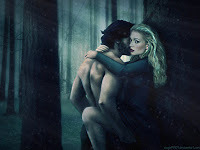 Her life is further complicated when vampires enter her orbit. At first, she thinks this is a wonderful thing because unlike humans, Sookie can't hear vampire thoughts. She's able to have a quiet mind with a man for the first time in her life when she begins dating the vampire, Bill, and is amazingly grateful to lose her virginity to him. However, her heart is broken when she learns that he was ordered to get close to her.
Her life is further complicated when vampires enter her orbit. At first, she thinks this is a wonderful thing because unlike humans, Sookie can't hear vampire thoughts. She's able to have a quiet mind with a man for the first time in her life when she begins dating the vampire, Bill, and is amazingly grateful to lose her virginity to him. However, her heart is broken when she learns that he was ordered to get close to her. Besides her disability, I like a lot of things about Sookie. Harris doesn't succumb to the temptation to make her extraordinary in other ways. She remains a believable character. Sookie never becomes a
Besides her disability, I like a lot of things about Sookie. Harris doesn't succumb to the temptation to make her extraordinary in other ways. She remains a believable character. Sookie never becomes a great fighter, and she remains a waitress throughout the series. Still, she is a strong woman who thinks for herself and always tries to do the right thing although, like all of us, she sometimes fails in this.
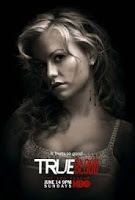 Don't judge Harris's books based on the HBO series, True Blood. They are a lot better. In True Blood, the characters aren't as interesting, the plots more far fetched, and the gruesomeness that I was okay with when reading about made me a little sick seeing it on the screen. I didn't get much past the first season. Besides, can anyone tell me what the theme song, "I want to do bad things with you," has to do with anything?
Don't judge Harris's books based on the HBO series, True Blood. They are a lot better. In True Blood, the characters aren't as interesting, the plots more far fetched, and the gruesomeness that I was okay with when reading about made me a little sick seeing it on the screen. I didn't get much past the first season. Besides, can anyone tell me what the theme song, "I want to do bad things with you," has to do with anything?If you've read the series, share your thoughts. If you haven't, you should check it out. You can get Dead After Dark by clicking on the link below:
Published on December 13, 2016 03:00



